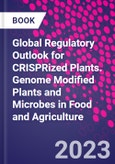Global Regulatory Outlook of CRISPRized Plants summarizes CRISPR/Cas systems and applications for precise editing of plant genomes and discusses global regulatory frameworks for CRISPR edited crops. While CRISPR technology has become a routine, cheap, and efficient method to generate edited crops with superior traits, how these crops are regulated determines the future of this technology. Understanding the current state of regulation, concerns, issues, and foundations for future decisions are key in determining how this technology is used going forward. This important summary will be vital to the successful commercialization of CRISPR technology and biosafety concerns associated with this technology. The book highlights regulatory classification of CRISPR modifications such as SDN1, SDN2 and SDN3 and their global regulation and discusses the social, ethical, governance, and policy issues related to CRISPR edited crops.
Please Note: This is an On Demand product, delivery may take up to 11 working days after payment has been received.
Table of Contents
1. Genome-edited plants regulations: Notes from editors
2. Online tools to track gene editing regulations in Agri-Food Sector
3. CRISPR/Cas Systems and Techniques
4. Applications of CRISPR/Cas in Plants
5. Reagents and their delivery systems in CRISPR/Cas
6. Regulatory Triggers of CRISPR edited crops
7. Tracking Footprints of CRISPR based genome editing
8. GMOs and Their Regulatory Frameworks
9. Regulatory Framework of CRISPR Edited Crops in USA
10. Regulation of CRISPR Edited Plants in Latin America
11. Regulatory outlook of CRISPR edited plants in Canada
12. Regulatory Aspects of CRISPR Edited Plants in EU
13. Regulation of CRISPR Edited Plants in Australia and New Zealand
14. Regulatory Overview of CRISPR Edited Plants in Asian Countries
15. Regulatory landscape of genome edited crops: A Japanese Perspective
16. Regulatory Status of CRISPR Edited Crops in Africa�
17. Regulation of�CRISPRized�Plants in Eastern Europe and Central Asia
18. Gene Editing Regulation in�Argentina
19. Food and feed safety considerations for genetically modified crops, in particular gene-edited ones, from a European perspective
20. CRISPR/cas�genome editing and applications in forest tree breeding
21. Social, Ethical, Policy and Governance Issue of CRISPR Edited Plants�








